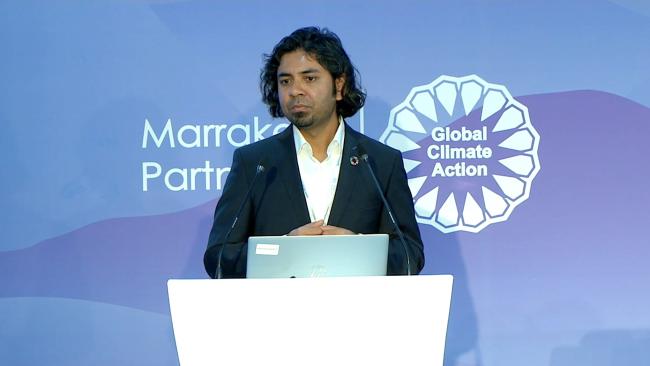Impressions from COP27
2023-01-09The climate change conference COP27 took place 6-18 of November 2022 in Sharm el Sheik, Egypt. Avit Bhowmik, research director at CRS and researcher in Risk and Environmental Studies at Karlstad University, was one of the participants.
What was your participation in COP27?
- I was part of an international team of scientists and practitioners who launched a new project “The Climate Long Game” at the Climate Action Hub pavilion of COP27. The project will utilise educational games and apps at schools to promote climate education and thereby convert the schools into living labs demonstrating successful climate action projects. The aim is to create collective efficacy at communities through schools to create the momentum of climate action and societal transformation at a scale and pace needed. We have already piloted the project in the USA, Germany and Armenia and are planning to cover Sweden, Italy, Ukraine and Bangladesh very soon. In addition, I also participated at the negotiations with the delegates of Armenia and Bangladesh.
What is your impression of the conference?
- This is the third COP I attended in person. This time I really had the impression that many of the pledges made are now turning into action. “Transparency” was the central theme of the negotiations I have participated. Many impactful projects from around the world were showcased at this COP, which are making real difference. One example is “Nuclear for Climate”, which is trying to create long needed public discourse around nuclear energy and its pros and cons. Another example is the Sweden-based action platform We Don’t Have Time initiated “We Can Do It” - a campaign with the target of raising the decarbonisation ambition of industries and corporates.
Do you think conferences like COP27 will make a difference for the climate?
- COPs are the conferences where national level climate negotiations take place, hence these are critical when it comes to climate policy measures. We have seen successes like the Paris Agreement as an outcome of COP21 where 193 nations pledged to limit global warming well below 2 degree Celsius. The “Loss and Damage Fund” from COP 27 assures to mobilise resources for adaptation to the countries that are most vulnerable to climate change.
What can individuals/families do to make a difference?
- It might sound surprising but I think individuals and families can drive impactful climate action. For a start, individuals and families can reduce their own ruminant meat consumption, cut their food wastes and increase recycling, use electricity produced from renewable sources, well insulate and retrofit their houses if they live in old ones, switch to bicycles and public trasport as their main mode of travel and choose holiday destinations that they can reach by train. But the real difference they can make is by driving systemic changes - by voting, raising climate issues to their local politicians, associations they are affiliated with, e.g. housing associations in Sweden, employers and colleagues and demanding action. According to Katharine Hayhoe, a renowned climate scientist, the most important thing they can do is TALK ABOUT IT.
More information:


